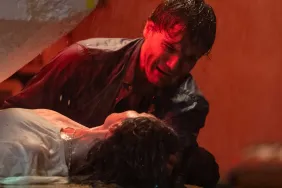
Nadine Labaki first gained international attention in 2007 when she wrote, directed and starred in the film Caramel. That film was distributed in over 40 countries, easily becoming the most internationally acclaimed and exposed Lebanese film to date. The story focused on the lives of five Lebanese women and the beauty shop they all frequent. The film dealt with issues such as forbidden love, tradition, repressed sexuality and the struggle to accept the natural process of age.
Caramel was considered unique because it didn’t focus on a war-ravaged Beirut, but rather a typical city filled with normal people dealing with universal issues. Some critics went so far as to dub Labaki, the Lebanese Nia Vardalos.
Labaki’s new film Where Do We Go Now? tackles more serious subject matter. It tells the story of a remote, isolated unnamed Lebanese village inhabited by both Muslims and Christians. The village is surrounded by land mines and is only reachable by a small bridge. As civil strife breaks out in the country, the two sides suddenly find themselves engulfed in turmoil despite having lived for years in relative peace.
The film is painted as a fantasy and uses musical numbers and humor throughout, despite the dark subject matter. The film was a surprise winner at the Toronto Film Festival last September when it beat out such highly regarded films as Moneyball, The Artist and The Descendants for the coveted Cadillac People’s Choice Award, which is voted on by festival attendees.
I was fortunate to interview Labaki and Ashgar Farhadi, director of A Separation, in the same week recently. Fortunate as I not only love both films, but because both films paint a more complex picture of the Middle East than we are used to seeing in the media. Characters with universal dreams, goals, problems and lifestyles. Something I think is incredibly refreshing to see.
Below is my interview with Labaki, which occurred over the phone as is evident from my first question. I hope you enjoy, and I hope you seek out Where Do We Go Now? as it just might be one of the year’s Foreign Language Oscar nominees and will likely hit theaters soon after that…
How’s Beirut today?
Nadine Labaki (NL): It’s great.
Has Where Do We Go Now? been released over there?
NL: Yes, yes. It has come out here.
How is is doing?
NL: It is doing wonderful. It is setting box office records in fact.
Did your last film Caramel also do well in Lebanon?
NL: Not like this film. The reaction here has been incredible for this one. But the market here is not big. That’s why there is such a need for popular movies compared to festival fare because we need to be able to work abroad outside the Lebanese market, which is very small. For a film to make money for the investors it needs to be popular abroad.
You talk about making popular films as opposed to festival fare, could you expand on that?
NL: Well, we’ve had a lot of war here in Lebanon. Films are sometimes the only way for people to escape reality. That’s why I like to use humor in all of my films. Humor is good to have in your soul. It makes you feel like you can do something about your situation when you are able to laugh. So I don’t like to make my films so heavy. Even this one, which is much more serious than Caramel is done as a fantasy. And I still use a lot of humor throughout the film. I think serious subjects go down easier when mixed with humor.

How important it is for your films to be able to play outside the region?
NL: It’s very important. And not just because of the money. You guys get a very false image of the whole picture here and film can paint the truth of what is really happening. I think sometimes people get a very negative impression what is happening here and that is very unfortunate.
I would imagine an Academy Award nomination would be helpful in that regard. What do you think your chances are?
NL: You would know more about that than I would, I’m not over there. What do you think the chances are?
Well, the film is getting a lot good press. And of course the track record for Audience Award winners at Toronto is very good as well.
NL: That’s good to hear. I don’t hear a lot about such things in Beirut.
Some people have mentioned that you are one of the few filmmakers outside the US that makes “chick flicks”…
NL: I don’t think I make “Chick Flicks”…
Your films do come from a woman’s perspective though.
NL: Yes, yes. I am a woman. I definitely have a woman’s perspective. I’m also a mother and I think because of that I feel resposible to try and make a difference. I believe everybody can make a change in the world. It’s very important to me to understand myself and my place in the world. My films help me with that and the more people see them the more I am making a statement.
Speaking of your place in the world, there has been a lot of talk recently about bringing back Sharia Law in many of the countries around Lebanon like Tunisia and Egypt. Do you worry about women getting pushed back on.
NL: Yes, I am worried about that.
What about the current situation in Syria? Will it have an effect on Lebanon?
NL: Everything in the region has an effect. But I don’t know what’s happening. I consider myself a filmmaker. I try to stay out of politics.
There has been a lot of mention that your films are not typical Middle Eastern films. Who are your influences?
NL: I think my biggest influence are the current filmmakers coming out of Iran. They have been making great films there and I am very influenced by what they are doing right now.
The only one I have ever met is Bahman Ghobadi, he directed Turtles Can Fly…
NL: Oh, that’s a film I was very influenced by. I loved that film and I loved what he did with non-actors. I work with a lot of non-actors in my films and pay attention to how other directors use peope in their films. Oh, yes. I was very influenced by that film.
Where Do We Go Now? does not have an official domestic release date as of yet, but I have included the trailer for the film out of the Toronto Film Festival directly below. I highly recommend it and if you haven’t yet read my interview with A Separation writer/director Ashgar Farhadi click here.









